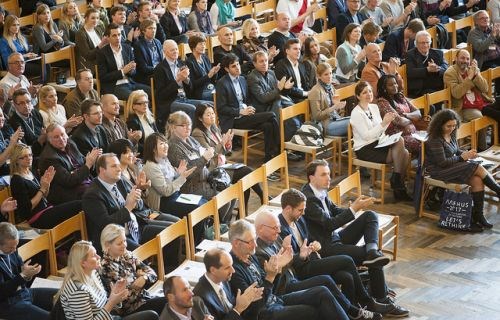Participants express great satisfaction with Play the Game 2015
”My second home”.
”… the conference needs to enlarge its impacts. Or else it will just be the same group of people speaking over and over again on the same issues. It wouldn't have any real impacts on real sports if it keeps on this way – it has to go into mainstream media and attract attention worldwide.”
”One of the most intense, informative and professionally managed conferences I've ever attended”.
”It is a hope that the conference contributes to the public debate, but there is still a missing link between the conference, the sport organizations and the media at large.”
”You can do "more" but with "less". Consider shortening the format to focus on quality, not quantity.”
The hundreds of engaged comments received from the participants of Play the Game 2015 through an anonymous online survey bring many varied messages.
But the overall conclusion from the 162 respondents – 53.4 percent of those who received the questionnaire – is quite uniform:
97% of the respondents rate the conference either ‘very good’ or ‘good’. This figure matches the satisfaction level expressed at the previous edition of the conference in 2013, but with a slight improvement: the share of the top grade ‘very good’ has gone up from 56 percent to almost 60 percent.
The results of the survey are part of an internal evaluation released today by Play the Game’s office. It may not come as a surprise that the organisers are quite happy with the outcome of their own conference, but at least their assessment finds support among the delegates:
Half of the participants (49.7%) assess that the conference did “stimulate and qualify the public debate about world sport” to “a very high degree”, and more than one third (36.1%) says “to a high degree”.
The most encouraging single figure is perhaps that 37.1% of the participants find that the 2015 conference will give value to their daily work “to a high extent” while 49% says “to some extent”.
“It is a relief and an encouragement that our participants respond so positively to the content we have offered in times where the public sports debate is radically different that when we started the initiative 18 years ago,” Play the Game’s international director Jens Sejer Andersen says.
“The many sports political taboos we struggled to break in the early years, are now highlighted and discussed by governments, media and sports fans in most of the world, so our challenge is now to add value to this debate. We are most thankful to the over 160 speakers – most of whom sacrificed time and money to join the conference – that we apparently did achieve this.”
Hard dilemma
Another challenge seems to be permanent: That a Play the Game conference simply offers too much content – “too many interesting things happening at the same minute”, as one participant puts it.
2015 was the first conference with up to five parallel tracks, and no less than 46% find that Play the Game offers too many presentations. The complaint most often heard from delegates is that they cannot go to everything they wish to.
“It is a dilemma that is hard to solve. Many participants would never be allowed to travel to Play the Game if they were not given a podium to speak from, and besides, it is one of our main goals to make room for an open and inclusive debate. Fortunately the satisfaction with the content of the parallel session is also on the rise, so our task is to work more with a lively format of the sessions,” Andersen says.
One of the first tasks of Play the Game in 2016 will be to select a host for the 2017 conference. To that matter it is interesting to see that two out of three participants (67.2%) think Play the Game should be held in alternating host countries, in Europe or beyond.
Play the Game’s international director expects a difficult choice.
“Aarhus has been an excellent host city and partner for the past two conferences, and we have various interesting signals from outside as well. We will look not only on financial security, but also on how we best ensure the development of the content and clout of the conference.”






